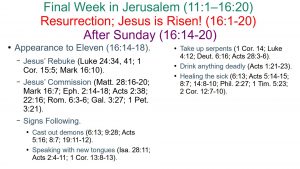Jesus’ Final Week in Jerusalem
Mark 11:1–16:20
Teaching (11:1–13:37)
King (11:1-11)
Sunday: Triumphal Entry (11:1-11).
Lawgiver (11:12–12:44)
Monday (11:12-19).
Tuesday (11:20–14:2).
Prophet (13:1-37)
Trial (14:1-72)
Sacrifice (14:1-26)
Wednesday (14:3-11).
Thursday (14:12-72)
Betrayed and Killed (14:27–15:47)
Death (15:1-47)
Friday (15:1-47).
Resurrection (16:1-20)
Jesus is Risen!
Sunday and Later (16:1-20).
Jesus’ Resurrection (16:1-8).
Question on Validity of the Following (16:9-20).
First Appearances (16:9-13).
Appearance to Eleven (16:14-18).
Jesus’ Rebuke (16:14).
Here we have the Great Commission, two verses we quote often when considering the plan of salvation.
This Commission, if this is a version of what we see in Matt. 28:16-20, occurs in Galilee.
Recall that the young man (angel) at the tomb told the women to tell the disciples—and Peter—to go to Galilee to see Him (16:7).
So while His first appearance to them (16:14) was in Jerusalem, this appearance now was in Galilee (16:15-18).
This effort to preach the gospel to every creature would take great faith, something they had just been lacking the verse before.
This gospel now is the good news of Jesus Christ, the truth of Jesus’ death, burial, and resurrection, and what that means for us.
They were to preach it to every creature, that is to the whole of creation, to everyone who is capable of hearing it, understanding it, and obeying it.
Of course, He’s not saying they needed to preach the gospel to cows, camels, or trees, but to human beings all over the world, with no distinction of who or what they are.
Before, there was a distinction between Jew and Gentile, but that distinction has no been dissolved at His crucifixion (Eph. 2:14-18) and realized in His commission.
These are the last marching orders of our Lord: tell everyone that the gospel is for all!
That gospel message is summarized in vs. 16, where we see what our response to this gospel message ought to be.
This is a very familiar passage to those of us in the churches of Christ because it is very clear on the necessity of baptism for salvation.
If we believe that gospel message that the Apostles preached and act upon it, we will be saved.
Is that all that’s required for salvation? No, certainly not (repentance is required, too – Acts 2:38), but if we have faith, then repentance will naturally follow.
And baptism will follow, too, so that we can be saved.
Without faith, however, we are lost, judged, damned, condemned, and will not have the salvation from that judgment that we so desire.
I’m sure many of us have shown this verse to others who didn’t believe in what the Bible says about baptism. What objections have you heard to the necessity of baptism after you’ve shown them this verse?
Of course there is the objection that this wasn’t there initially, that it was added later, so we don’t need to follow it. The answer to that would be (if you accept that it wasn’t there before), that it wasn’t long before it was added and accepted. Someone early on believed it belonged there and believed in the necessity of baptism.
Those who believe it ought to be there might say, “Well, it doesn’t say that if you’re not baptized you will be condemned.” That’s a dishonest argument; they are grasping at straws. What that verse teaches is what you need to do to be saved: believe and be baptized. What do you need to do to be condemned? Don’t believe. If you don’t believe, baptism is irrelevant.
